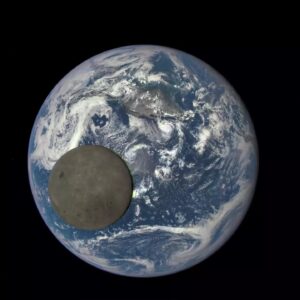When you think we know everything about our planet, something new comes to light
While you may not think the Moon drifting away from Earth would impact us too much, you’d be mistaken.
Most of us are probably guilty of thinking that the Earth’s only natural satellite remains at a constant distance from our planet.
And that is all because of gravitational pull. Does that remind anyone of science lessons at high school?
But recent scientific discoveries have found an ever-weakening connection between the Earth and the Moon – but why is that?
Well, what we do know is that this gradual breakdown has resulted in the globe spinning slower, and as a result, having a major impact on time.
In fact, scientists have found that days on Earth are getting longer because the Moon is slowly drifting away.
Scientists believe that a day on the globe 1.4 billion years ago, lasted just 18 hours.

The Moon is drifting away from Earth. (NASA/NOAA)
“As the Moon moves away, the Earth is like a spinning figure skater who slows down as they stretch their arms out,” said co-author of the study Professor Stephen Meyers, of the University of Wisconsin-Madison.
“One of our ambitions was to use Astrochronology to tell time in the most distant past, to develop very ancient geological time scales,” he continued. “We want to be able to study rocks that are billions of years old in a way that is comparable to how we study modern geologic processes.”
Astrochronology is the method of linking astronomical theory with geological observation.
In 2022, Professor Meyers worked with his team to look back at the Earth’s past and recreate what he believes the solar system previously looked like.
The researchers studied sediments from a 90 million-year-old rock formation. This is how the team reportedly discovered the Earth’s climate cycles.

From the findings, we know that the Moon is currently receding from the Earth at a rate of 1.5 inches (3.81 centimetres) every year.
Scientists have also concluded that the Moon once would have been so close that the Earth’s gravitational interactions would have ripped apart the Moon.
Professor Alberto Malinvero, co-author of the study said: “It was exciting because, in a way, you dream of this all the time; I was a solution looking for a problem.”
However, it is important to note that scientists know that the Moon itself is 4.5 billion years old. Therefore, their calculations could be somewhat inaccurate.
One thing is for sure though, days on Earth are definitely getting longer.